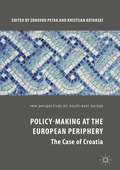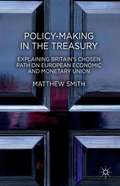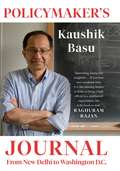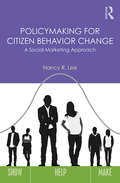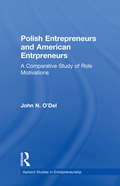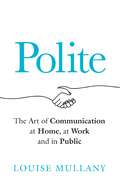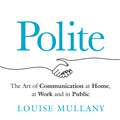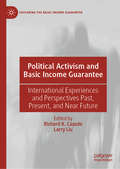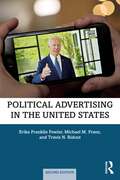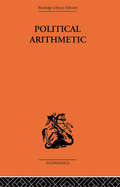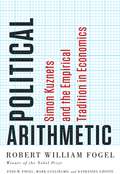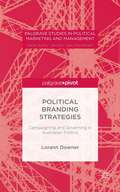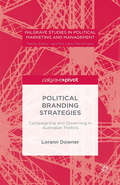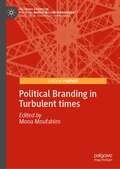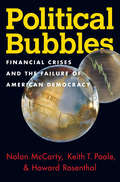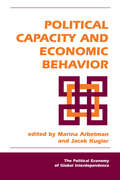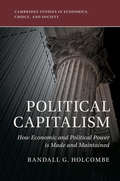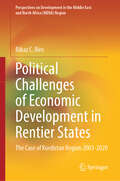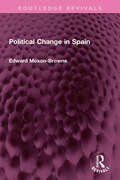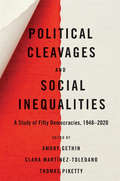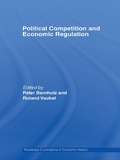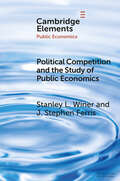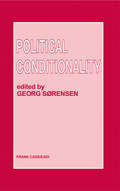- Table View
- List View
Policy-Making at the European Periphery: The Case Of Croatia (New Perspectives on South-East Europe)
by Zdravko Petak Kristijan KotarskiThis book examines Croatia's economic and political transformation over the last 30 years. It brings together the best political scientists, macroeconomists and public finance experts from Croatia to provide an in-depth analysis of the Croatian policy-making context and the impact of Europeanization upon its domestic institutional framework. The second part of the book scrutinizes the political economy context and Croatia's long-term macroeconomic under-performance, especially in comparison to other transition economies. The final part explores sectoral public policies, including cohesion policy, education, health, pensions, and local government. The book offers a unique blend of Croatia's political economy framework and public policy analysis.
Policy-Making in the Treasury
by Matthew SmithGoing behind the doors of the Treasury and Number 10, this book explores why successive British Prime Ministers from Callaghan to Blair have been hesitant towards European Economic and Monetary Union. It uses official documents and interviews with former ministers to understand discussions that took place at the heart of government.
Policymaker's Journal: From New Delhi to Washington D.C.
by Kaushik BasuThis book charts the course of Kaushik Basu&’s career over seven years, as he moved out of the cloisters of academe to the frenetic world of policymaking, first in India as Chief Economic Adviser to the Indian Government and after that as Chief Economist at the World Bank in Washington.The Indian years were a period of high inflation, growth challenges (as the global financial crisis arrived in India), and also a remarkable growth recovery story, with India moving past China&’s GDP growth rate. There were corruption scandals breaking, causing widespread street protests, a lot of late-night decision-making, which one knew would rock the stock market the next day, and getting to know politicians who were outstanding as statesmen in the midst of all this, and also many who were not.The World Bank years weren&’t that close to actual policymaking, but nevertheless breath-taking in their scope. They ranged from interacting with policymakers in tiny remote countries like Samoa to gigantic nations with comparable heft, such as China. It entailed sitting down with leading researchers to compute and announce global numbers on extreme poverty and rankings on how easy it is to do business in different countries (fully aware that there would be calls from irate finance ministers as soon as these were published). And there was the handling of politics within the World Bank, which could actually be as enjoyable as any global economic problem!This book is a revised version of the diary that Kaushik Basu kept for seven years. Revised because he often wrote the diary in a hurry at the day&’s or even week&’s end. He has now inserted some reflections in retrospect, without altering any descriptions of what actually happened.
Policymaking for Citizen Behavior Change: A Social Marketing Approach
by Nancy R. LeeSocial marketing is a discipline unfamiliar to many policymakers, often confused with the more frequently applied and studied fields of social media, behavioral economics, or social change. Social marketing is a growing field and methodology, however, that has been successfully applied to improve public health, prevent injuries, protect the environment, engage communities, and improve financial well-being. Policymaking for Citizen Behavior Change is designed to demonstrate the ways in which social marketing can be an effective and efficient tool to change citizens’ behavior, and how to advocate for and support its appropriate application. Providing a 10-Step Planning Model and examining a variety of social marketing cases and tools, including more than 40 success stories, Policymaking for Citizen Behavior Change is core reading for current policymakers, as well as all those studying and practicing social marketing, particularly in the public sector. It’s also worthwhile supplementary reading for those studying public policy, public administration, environmental justice, public health, and other programs on how to effect social change.
Polish Entrepreneurial Law in the Era of the COVID-19 Pandemic: Problems and Challenges (Ius Gentium: Comparative Perspectives on Law and Justice #114)
by Edyta HadrowiczThe outbreak of the COVID-19 pandemic presented Polish legislators with a host of legal dilemmas, the aftermath of which resulted in numerous legislative changes. A significant part of these relate to entrepreneurial law in a broad sense. However, the situation created by the COVID-19 pandemic also had a broader dimension, resulting in the introduction of exceptions as the global norm. Similarly, in the domestic legal order, the actions of public authorities in various forms (restrictions, limitations, and ultimately the Lockdown), as well as non-legislative legal activity gave rise to many problems in Poland and have been the subject of various assessments. Hence, the book analyses the legal situation of entrepreneurs in the era of the COVID-19 pandemic both in terms of the amendments and changes introduced and the new regulations, commonly referred to in the public sphere as "covid laws" or "anti-covid shields". Therefore, the book assesses the legal solutions and the level of legislative technique in the broadly understood entrepreneurial law. It focuses on the solutions introduced by Polish legislators and seeks to answer the following questions: to what extent did the relevant public authorities appropriately respond to the threats posed by the pandemic, and did they effectively provide legal protection for entrepreneurs?
Polish Entrepreneurs and American Entrepreneurs: A Comparative Study of Role Motivations (Garland Studies in Entrepreneurship)
by John O'DelFirst published in 1997. Routledge is an imprint of Taylor & Francis, an informa company.
Polite: The Art of Communication at Home, at Work and in Public
by Louise MullanyThe first ever mass-market book on politeness and the important role it plays in our work, relationships and lives, from professor and pioneer of Politeness Theory, Louise MullanyAre women really more polite than men?What is the best way to apologise?And when is it OK to swear?Politeness rules our day-to-day lives, whether it's speaking to colleagues about issues at work, dealing with difficult family members or wondering if you should eat the last piece of pie. For years, Professor Louise Mullany has been examining the prevalence and power of politeness in our everyday speech and actions, and discovering what this says about us.In Polite, Louise shows how the unseen science of politeness governs everything we do, from what we say to how we act, and reveals how a better understanding of the rules and norms of politeness can help us in all aspects of our work, leisure and home lives.And, in doing so, she answers the age-old question... are politeness standards really declining?
Polite: The Art of Communication at Home, at Work and in Public
by Louise MullanyThe first ever mass-market book on politeness and the important role it plays in our work, relationships and lives, from professor and pioneer of Politeness Theory, Louise Mullany'Fascinating and insightful. I'm grateful to have read it, and pleased to have learnt so much in the process. I would - politely - encourage you to do the same.' Jon McGregorAre women really more polite than men?What is the best way to apologise?And when is it OK to swear?Politeness rules our day-to-day lives, whether it's speaking to colleagues about issues at work, dealing with difficult family members or wondering if you should eat the last piece of pie. For years, Professor Louise Mullany has been examining the prevalence and power of politeness in our everyday speech and actions, and discovering what this says about us.In Polite, Louise shows how the unseen science of politeness governs everything we do, from what we say to how we act, and reveals how a better understanding of the rules and norms of politeness can help us in all aspects of our work, leisure and home lives.And, in doing so, she answers the age-old question... are politeness standards really declining?'A must-read for anyone interested in becoming a more effective communicator.' Michael Haugh, The University of Queensland
Political Activism and Basic Income Guarantee: International Experiences and Perspectives Past, Present, and Near Future (Exploring the Basic Income Guarantee)
by Richard K. Caputo Larry LiuThis edited volume brings together international and national scholars and major activists leading or spearheading basic income guarantee political initiatives in their respective countries. Contributing authors address specific issues about major efforts to influence public policy regarding basic income guarantee, such as: who were the main advocates and thought leaders involved in support of such legislative initiatives; what were the main organizational and framing strategies and tactics used to influence public opinion and elected officials to support the idea of and policies related to basic income guarantee; what were the major obstacles they faced; and what practical and theoretical lessons might be learned from past and contemporary actions to affect social policy change regarding basic income guarantee and related measures to guide the efforts of activists and public intellectuals in the 2020 and 2024 election cycles.
Political Advertising in the United States
by Michael M. Franz Travis N. Ridout Erika Franklin FowlerPolitical Advertising in the United States examines the volume, distribution, content, and effects of political advertising in congressional and presidential elections. The book considers the role of television ads using extensive data on ad airings on local broadcast stations. It also analyzes newly available data on paid digital ads, including ads on Facebook, Instagram, Google, and YouTube. The book covers the role of outside groups in airing ads, including the rise of dark money groups and gaps in existing federal campaign finance laws around transparency of outside group spending. The authors consider how ad sponsors design and target ads. They also review the positive and negative implications of an electoral system where billions are spent on paid advertising. With detailed analysis of presidential and congressional campaign ads and discussion questions in each chapter, this accessibly written book is a must-read for students, scholars, and practitioners who want to understand the ins and outs of political advertising. New to the Second Edition • Covers the spending, content, and tone of political advertising in the 2016 and 2020 presidential elections and the 2018 midterms, looking ahead to 2022 and 2024. • Addresses the interference of foreign actors in elections and their connection to political advertising. • Expands the discussion of digital political advertising and incorporates this topic into every chapter. • Adds a new chapter specifically addressing digital ad content and spending. • Includes data from the Facebook, Google, and Snapchat ad libraries and explores the role of these companies in regulating the sale of political advertising. • Incorporates new data on the effects of race and gender in advertising, including what is known about the way in which advertising may activate prejudicial attitudes.
Political Arithmetic: A Symposium of Population Studies
by Lancelot HogbenEncompassing the areas of economics, sociology, social biology and genetics, and drawing on studies from the UK and Australia, this volume charts and analyses the factors affecting population growth. Chapters include:* The international decline in fertility* The changing structure of the family* Educational opportunities* Concepts of race.
Political Arithmetic: Simon Kuznets and the Empirical Tradition in Economics (Nber-long-term Factors In Economic Devel Ser.)
by Enid M. Fogel Mark Guglielmo Nathaniel Grotte Robert WilliamWe take for granted today that the assessments, measurements, and forecasts of economists are crucial to the decision-making of governments and businesses alike. But less than a century ago that wasn’t the case—economists simply didn’t have the necessary information or statistical tools to understand the ever more complicated modern economy. With Political Arithmetic, Nobel Prize–winning economist Robert Fogel and his collaborators tell the story of economist Simon Kuznets, the founding of the National Bureau of Economic Research, and the creation of the concept of GNP, which for the first time enabled us to measure the performance of entire economies. The book weaves together the many strands of political and economic thought and historical pressures that together created the demand for more detailed economic thinking—Progressive-era hopes for activist government, the production demands of World War I, Herbert Hoover’s interest in business cycles as President Harding’s commerce secretary, and the catastrophic economic failures of the Great Depression—and shows how, through trial and error, measurement and analysis, economists such as Kuznets rose to the occasion and in the process built a discipline whose knowledge could be put to practical use in everyday decision-making. The product of a lifetime of studying the workings of economies and skillfully employing the tools of economics, Political Arithmetic is simultaneously a history of a key period of economic thought and a testament to the power of applied ideas.
Political Branding Strategies: Campaigning and Governing in Australian Politics (Palgrave Studies In Political Marketing And Management)
by Lorann DownerPolitical Branding Strategies.
Political Branding Strategies: Campaigning and Governing in Australian Politics (Palgrave Studies in Political Marketing and Management)
by Lorann DownerPolitical Branding Strategies tells the story of branding by the Australian Labor Party across seven years and three brands – Kevin07, The Real Julia and that of the party. Employing a new framework to understand and evaluate branding, the book offers lessons for practitioners, researchers and citizens in democracies everywhere.
Political Branding in Turbulent times (Palgrave Studies in Political Marketing and Management)
by Mona MoufahimPolitical uncertainty and instability characterise many regions around the world and, increasingly, can be observed in more established democracies. The COVID-19 pandemic, national and international tensions, and the proliferation of autocratic, chauvinist, and, at the most extreme, fascist forces around the world all contribute to turbulent political times. Such environments constitute tremendous challenges, but also opportunities for scholars to contribute to an understanding of processes in the political market, using the lens of political branding theories. Authors from various disciplinary backgrounds, including social psychology, marketing, and media and communications, provide commentaries and analyses of branding processes in different national contexts, all characterised by tensions and challenges. The topical and provocative content of the chapters, all focusing on recent political events and phenomena in the political arena, should appeal to researchers, branding practitioners, politicians, and members of the public seeking to deepen their understanding of current events and political branding concepts.
Political Bubbles: Financial Crises and the Failure of American Democracy
by Keith T. Poole Howard Rosenthal Nolan McCartyHow governmental failure led to the 2008 financial crisis—and what needs to be done to avoid another similar event Behind every financial crisis lurks a "political bubble"—policy biases that foster market behaviors leading to financial instability. Rather than tilting against risky behavior, political bubbles—arising from a potent combination of beliefs, institutions, and interests—aid, abet, and amplify risk. Demonstrating how political bubbles helped create the real estate-generated financial bubble and the 2008 financial crisis, this book argues that similar government oversights in the aftermath of the crisis undermined Washington's response to the "popped" financial bubble, and shows how such patterns have occurred repeatedly throughout US history.The authors show that just as financial bubbles are an unfortunate mix of mistaken beliefs, market imperfections, and greed, political bubbles are the product of rigid ideologies, unresponsive and ineffective government institutions, and special interests. Financial market innovations—including adjustable-rate mortgages, mortgage-backed securities, and credit default swaps—become subject to legislated leniency and regulatory failure, increasing hazardous practices. The authors shed important light on the politics that blinds regulators to the economic weaknesses that create the conditions for economic bubbles and recommend simple, focused rules that should help avoid such crises in the future.The first full accounting of how politics produces financial ruptures, Political Bubbles offers timely lessons that all sectors would do well to heed.
Political Business in East Asia (Politics in Asia)
by Edmund GomezThe relationship between government and business has become a central issue in East Asia since the financial crisis of 1997. As the Asian economies try to advance the reform process, recent scandals involving corruption and cronyism have demonstrated the ongoing significance of the issue. This edited book features a range of distinguished international specialists and explores the interaction between politics and business across the region. Detailed case-studies focus on Japan, China, South Korea, Malaysia, Thailand, Singapore and Indonesia. This is the first comprehensive introduction to government-business relations in the region and makes a significant contribution to our understanding of the problems faced by the Asian economies.
Political Capacity and Economic Behavior (The Political Economy of Global Interdependence)
by Jacek Kugler<p>Given today's heightened competition between national economies in the global marketplace, many have come to believe that government intervention is needed in order for a country to maximize its economic well-being. But to what extent can even the most capable government act to attract investment and enhance economic growth without creating or exacerbating conflicts in society—especially when unpopular measures, such as those aimed at controlling inflation and population growth, must be implemented? <p>This timely book by an international team of economists and political scientists tackles that question head on. The contributors draw on theory and empirical data to provide a framework for measuring governments' ability to gather material resources and mobilize populations. They analyze a variety of policy choices made in the United States and in other nations around the world during the past fifty years, showing how states can increase their political capacity and thereby reduce economic transaction costs and domestic resistance to government goals.
Political Capitalism: How Political Influence Is Made and Maintained (Cambridge Studies in Economics, Choice, and Society)
by Randall G. HolcombeProblems associated with cronyism, corporatism, and policies that favor the elite over the masses have received increasing attention in recent years. Political Capitalism explains that what people often view as the result of corruption and unethical behavior are symptoms of a distinct system of political economy. The symptoms of political capitalism are often viewed as the result of government intervention in a market economy, or as attributes of a capitalist economy itself. Randall G. Holcombe combines well-established theories in economics and the social sciences to show that political capitalism is not a mixed economy, or government intervention in a market economy, or some intermediate step between capitalism and socialism. After developing the economic theory of political capitalism, Holcombe goes on to explain how changes in political ideology have facilitated the growth of political capitalism, and what can be done to redirect public policy back toward the public interest.
Political Challenges of Economic Development in Rentier States: The Case of Kurdistan Region 2003-2020 (Perspectives on Development in the Middle East and North Africa (MENA) Region)
by Ribaz C. BiroThis book investigates the relationship between politics and economics in rentier states, with a particular focus on the Kurdistan Region of Iraq from 2003 to 2020. Resource-rich states face low levels of economic growth due to the various factors of corruption, weak performance of institutions, poor levels of accountability and transparency in governance, and absence of rule of law. While most previous studies of the topic focus on either the political or economic concerns, this book focuses on their interaction. The book explores the political hurdles in resource-rich states, examining to what extent this impedes economic growth through panel data from 51 rentier states from 2003 to 2020 with different political systems and different types of natural resource dependency. The insights presented in this book have wider implications for understanding and solving similar hurdles in the Kurdistan Region of Iraq and would be a valuable resource for policymakers, strategists, academics, lawmakers, and government officials in implementing sustainable development plans and reducing the negative impacts of natural resource over-reliance in rentier states.
Political Change in Spain (Routledge Revivals)
by Edward Moxon-BrowneFirst published in 1989, Political Change in Spain provides a stimulating and innovative account of Spain’s maturing democracy since 1982. Challenging the accepted wisdom that Spanish democracy is a fragile plant, the author demonstrates its strong roots and healthy growth in the context of the European Community. He argues that, despite the problems of economic transformation, Spain’s political attachments to Western Europe suggest that the Spanish economy will benefit in the long run from its increasing integration with its neighbours. The book also analyses the continuing threat to stability posed by separatist aspirations in the Basque country, in the context of the experiments with autonomous regional governments. This book will be valuable to anyone looking for a succinct introduction to changes in Spain, as well as to students of Western European politics, women’s studies and the Spanish language.
Political Cleavages and Social Inequalities: A Study of Fifty Democracies, 1948–2020
by Thomas Piketty Amory Gethin Clara Martínez-ToledanoThe empirical starting point for anyone who wants to understand political cleavages in the democratic world, based on a unique dataset covering fifty countries since World War II.Who votes for whom and why? Why has growing inequality in many parts of the world not led to renewed class-based conflicts, seeming instead to have come with the emergence of new divides over identity and integration? News analysts, scholars, and citizens interested in exploring those questions inevitably lack relevant data, in particular the kinds of data that establish historical and international context. Political Cleavages and Social Inequalities provides the missing empirical background, collecting and examining a treasure trove of information on the dynamics of polarization in modern democracies.The chapters draw on a unique set of surveys conducted between 1948 and 2020 in fifty countries on five continents, analyzing the links between voters’ political preferences and socioeconomic characteristics, such as income, education, wealth, occupation, religion, ethnicity, age, and gender. This analysis sheds new light on how political movements succeed in coalescing multiple interests and identities in contemporary democracies. It also helps us understand the conditions under which conflicts over inequality become politically salient, as well as the similarities and constraints of voters supporting ethnonationalist politicians like Narendra Modi, Jair Bolsonaro, Marine Le Pen, and Donald Trump.Bringing together cutting-edge data and historical analysis, editors Amory Gethin, Clara Martínez-Toledano, and Thomas Piketty offer a vital resource for understanding the voting patterns of the present and the likely sources of future political conflict.
Political Competition and Economic Regulation (Routledge Explorations In Economic History Ser. #Vol. 36)
by Peter Bernholz Roland VaubelOrganized, readable, technically sound and comprehensive from both theoretical and empirical standpoints, this book summarizes a vast amount of institutional, historical and descriptive detail.Using case studies from the US, Canada, Germany and Switzerland as well as the European Union and the global economy, this is the first book of its kind to e
Political Competition and the Study of Public Economics (Elements in Public Economics)
by Stanley L. Winer J. Stephen FerrisWhy is an understanding of political competition essential for the study of public economics and public policy generally? How can political competition be described and understood, and how does it differ from its strictly economic counterpart? What are the implications of the fact that policy proposals in a democracy must always pass a political test? What are the strengths and weaknesses of electoral competition as a mechanism for the allocation of economic resources? Why are tax structures in democratic polities so complicated, and what implications follow from this for normative views about good policy choice? How can we measure the intensity of political competition, why and how does it vary in mature democracies, and what are the consequences? This Element considers the approach to answer these questions, while also illustrating some of the interesting theoretical and empirical work that has been done on them.
Political Conditionality
by Sørensen GeorgPolitical conditionality involves the linking of development aid to certain standards of observance of human rights and (liberal) democracy in recipient countries. Although this may seem to be an innocent policy, it has the potential to bring about a dramatic change in the basic principles of the international system: putting human rights first means putting respect for individuals and rights before respect for the sovereignty of states.
